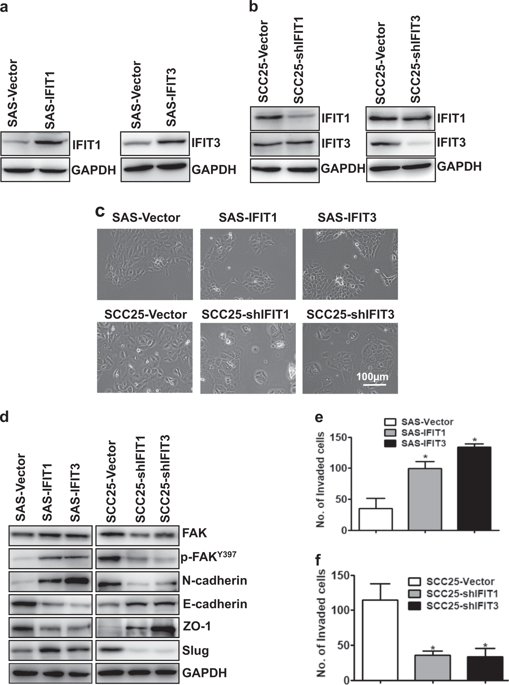Our official English website, www.x-mol.net, welcomes your
feedback! (Note: you will need to create a separate account there.)
IFIT1 and IFIT3 promote oral squamous cell carcinoma metastasis and contribute to the anti-tumor effect of gefitinib via enhancing p-EGFR recycling.
Oncogene ( IF 6.9 ) Pub Date : 2019-Jan-09 , DOI: 10.1038/s41388-018-0662-9 Vijaya Kumar Pidugu , Meei-Maan Wu , Ai-Hsin Yen , Hima Bindu Pidugu , Kuo-Wei Chang , Chung-Ji Liu , Te-Chang Lee
Oncogene ( IF 6.9 ) Pub Date : 2019-Jan-09 , DOI: 10.1038/s41388-018-0662-9 Vijaya Kumar Pidugu , Meei-Maan Wu , Ai-Hsin Yen , Hima Bindu Pidugu , Kuo-Wei Chang , Chung-Ji Liu , Te-Chang Lee

|
IFIT1 and IFIT3 are abundant products of interferon-stimulating genes. While the importance of IFIT1 and IFIT3 in the prognosis of cancer has been reported, the molecular basis of IFIT1 and IFIT3 in cancer progression remains unexplored. In the present study, we investigated the modes of action and the clinical significance of IFIT1 and IFIT3 in oral squamous cell carcinoma (OSCC). Ectopic expression of IFIT1 or IFIT3 induced OSCC cell invasion by promoting the epithelial-mesenchymal transition, whereas IFIT1 or IFIT3 knockdown exhibited opposite effects. Overexpression of IFIT1 or IFIT3 promoted tumor growth, regional and distant metastasis in xenograft and orthotopic nude mice models. Most importantly, IFIT1 or IFIT3 overexpression increased the levels of p-EGFRY1068 and p-AKTS473 in OSCC cells and also enhanced tumor inhibitory effect of gefitinib. By immunoprecipitation and LC-MS/MS analysis, we found that IFIT1 and IFIT3 interacted with ANXA2 that enhanced p-EGFRY1068 endosomal recycling. Depletion of ANXA2 using siRNA therefore abolished p-EGFRY1068 and p-AKTS473 expression in IFIT1- or IFIT3-overexpressed cells. Furthermore, a significant positive association of increased IFIT1 and IFIT3 expression with advanced T-stage, lymph node metastasis, perineural invasion, lymphovascular invasion, extranodal extension, and poor overall survival rate was confirmed in OSCC patients. We also found a statistically positive correlation of p-EGFRY1068 expression with IFIT1 and IFIT3 in OSCC tumors and poor clinical outcome in patients. Collectively, we demonstrated a novel role of IFIT1 and IFIT3 in driving OSCC progression and metastasis by interacting with ANXA2 and hence enhancing p-EGFR recycling and its downstream signaling.
中文翻译:

IFIT1和IFIT3促进口腔鳞状细胞癌转移,并通过增强p-EGFR再循环来促进吉非替尼的抗肿瘤作用。
IFIT1和IFIT3是干扰素刺激基因的丰富产物。尽管已经报道了IFIT1和IFIT3在癌症预后中的重要性,但是仍未探索IFIT1和IFIT3在癌症进展中的分子基础。在本研究中,我们研究了口腔鳞状细胞癌(OSCC)中IFIT1和IFIT3的作用方式和临床意义。IFIT1或IFIT3的异位表达通过促进上皮-间充质转化而诱导OSCC细胞侵袭,而IFIT1或IFIT3的组合则表现出相反的作用。IFIT1或IFIT3的过表达促进了异种移植和原位裸鼠模型中的肿瘤生长,区域和远处转移。最重要的是,IFIT1或IFIT3过表达会增加p-EGFR Y1068和p-AKT S473的水平在OSCC细胞中的作用也增强了吉非替尼的肿瘤抑制作用。通过免疫沉淀和LC-MS / MS分析,我们发现IFIT1和IFIT3与ANXA2相互作用,从而增强了p-EGFR Y1068内体循环。因此,使用siRNA耗尽ANXA2消除了IFIT1或IFIT3过表达的细胞中p-EGFR Y1068和p-AKT S473的表达。此外,在OSCC患者中证实了IFIT1和IFIT3表达增加与晚期T期,淋巴结转移,神经周浸润,淋巴血管浸润,结外扩展以及不良总生存率之间存在显着正相关。我们还发现p-EGFR Y1068在统计学上呈正相关IFIT1和IFIT3在OSCC肿瘤中的表达以及患者的临床预后较差。集体地,我们展示了IFIT1和IFIT3通过与ANXA2相互作用并因此增强p-EGFR回收及其下游信号传导,在驱动OSCC进展和转移中的新作用。
更新日期:2019-01-26
中文翻译:

IFIT1和IFIT3促进口腔鳞状细胞癌转移,并通过增强p-EGFR再循环来促进吉非替尼的抗肿瘤作用。
IFIT1和IFIT3是干扰素刺激基因的丰富产物。尽管已经报道了IFIT1和IFIT3在癌症预后中的重要性,但是仍未探索IFIT1和IFIT3在癌症进展中的分子基础。在本研究中,我们研究了口腔鳞状细胞癌(OSCC)中IFIT1和IFIT3的作用方式和临床意义。IFIT1或IFIT3的异位表达通过促进上皮-间充质转化而诱导OSCC细胞侵袭,而IFIT1或IFIT3的组合则表现出相反的作用。IFIT1或IFIT3的过表达促进了异种移植和原位裸鼠模型中的肿瘤生长,区域和远处转移。最重要的是,IFIT1或IFIT3过表达会增加p-EGFR Y1068和p-AKT S473的水平在OSCC细胞中的作用也增强了吉非替尼的肿瘤抑制作用。通过免疫沉淀和LC-MS / MS分析,我们发现IFIT1和IFIT3与ANXA2相互作用,从而增强了p-EGFR Y1068内体循环。因此,使用siRNA耗尽ANXA2消除了IFIT1或IFIT3过表达的细胞中p-EGFR Y1068和p-AKT S473的表达。此外,在OSCC患者中证实了IFIT1和IFIT3表达增加与晚期T期,淋巴结转移,神经周浸润,淋巴血管浸润,结外扩展以及不良总生存率之间存在显着正相关。我们还发现p-EGFR Y1068在统计学上呈正相关IFIT1和IFIT3在OSCC肿瘤中的表达以及患者的临床预后较差。集体地,我们展示了IFIT1和IFIT3通过与ANXA2相互作用并因此增强p-EGFR回收及其下游信号传导,在驱动OSCC进展和转移中的新作用。











































 京公网安备 11010802027423号
京公网安备 11010802027423号